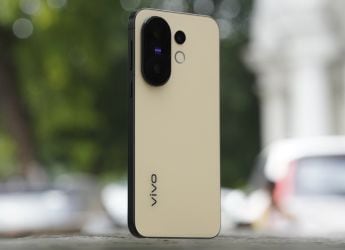- Home
- Mobiles
- Mobiles Features
- From Spies to Smartphones: Britain's Aga Set for Another New Chapter
From Spies to Smartphones: Britain's Aga Set for Another New Chapter

The acquisition of Aga for $202 million (roughly Rs. 1,331 crores) by Middleby Corporation follows a brief bidding war with US rival Whirlpool for the maker of the colourful cast-iron stoves that can weigh as much as a male polar bear, cost $18,000 (roughly Rs. 11,86,725) and, in older versions, take two days to heat.
The deal, set to be completed this week, marks the latest in a list of premium British brands to fall under foreign ownership in recent years, to the dismay of some business commentators who want to see it kept in British hands.
But the sale to a US company is also testament to the enduring appeal of a product invented in 1922, the year James Joyce's "Ulysses" was published and radio took off.
In Britain, it has become synonymous with aspirational middle-class country living and inspires huge loyalty in owners, including members of the royal family and Prime Minister David Cameron.
It struggled as demand was hit during the global financial crisis, but has recently returned to form with modern, more efficient versions of the cooker, and hopes to build on its heritage by exploiting Middleby's global network.
"The fundamental design of the Aga has always been its virtue but behind the front and the look is now a completely different product," Aga Rangemaster CEO William McGrath told Reuters, before he steps down as part of the sale.
"The design makes it iconic, the radiant heat makes it iconic but how it is delivered is something that has changed from generation to generation, from solid fuel, through oil and gas to electric and now programmable electric."
The heat, created by the continuously burning stove, made the old Aga distinctive, but it also drew its critics.
Great in winter when it could heat half the house, one owner complained that you "sweat buckets while boiling an egg" in summer. For many the cost of fuel can also prove prohibitive while environmental groups criticised the impact of the traditional stoves.
Modern versions can be easily switched on and off, including with a smartphone, while smaller models have been created to appeal to city dwellers.
Around 80 percent of those sold today are the newer, more efficient designs that have been launched since 2011, and are offered in a variety of colours from rose, pewter and lemon to pistachio and aubergine.
"You can get all the virtues of an Aga in a 60 centimetre package, which is something we'd expect over the next five to 10 years to become a more and more appreciable part of the business," said McGrath. The largest version of the stove can be 2.5 times that size.
Aspirational living
McGrath said the new owner was also drawn to its heritage - a company with a history that reads like a spy novel.
Created in 1922, the first Aga was invented by Swedish Nobel Prize winning physicist Gustaf Dalen who, confined to his home after being blinded in an accident, witnessed his wife struggling to cook on their old range.
By 1929 manufacturing had begun in central England, with early sales driven by David Ogilvy, a salesman who went on to become one of the most famous advertising men in the world, the original 'Mad Men' and founder of the Ogilvy & Mather ad agency.
Newer versions were designed by Raymond Loewy - who produced some of the most famous product designs in history, includingGreyhound Scenicruiser buses, Coca-cola vending machines, Lucky Strike boxes and the livery of Air Force One. He worked with Douglas Scott, who later designed London's famous red buses.
A written history of the company notes however that several of the leading protagonists including Ogilvy, his brother Francis and W.T. Wren, an early Aga boss, also played important roles for Britain in World War Two, either as spies, writing for Winston Churchill or in aircraft manufacturing.
Britain is still Aga's biggest market but they can now be found in the United States, Europe and China, and Middleby aims to take the brand further afield.
The sale adds to concern among some Britons about the number of prominent companies that have been bought by foreign owners, including department store Harrods, toy brand Hamleys and chocolate maker Cadbury. They fear that such sales could ultimately put UK jobs at risk and dilute much of the brand's appeal - its intrinsic Britishness.
McGrath is more positive, saying his firm hopes to mirror the success of another luxury British brand, Jaguar Land Rover, which has flourished under the ownership of India's Tata Group.
"We'd love to get in the wheel tracks of Jaguar Land Rover," said McGrath. "Now the product has evolved, the potential can be immense because the brand is much loved."
© Thomson Reuters 2015
Catch the latest from the Consumer Electronics Show on Gadgets 360, at our CES 2026 hub.
Related Stories
- Samsung Galaxy Unpacked 2025
- ChatGPT
- Redmi Note 14 Pro+
- iPhone 16
- Apple Vision Pro
- Oneplus 12
- OnePlus Nord CE 3 Lite 5G
- iPhone 13
- Xiaomi 14 Pro
- Oppo Find N3
- Tecno Spark Go (2023)
- Realme V30
- Best Phones Under 25000
- Samsung Galaxy S24 Series
- Cryptocurrency
- iQoo 12
- Samsung Galaxy S24 Ultra
- Giottus
- Samsung Galaxy Z Flip 5
- Apple 'Scary Fast'
- Housefull 5
- GoPro Hero 12 Black Review
- Invincible Season 2
- JioGlass
- HD Ready TV
- Laptop Under 50000
- Smartwatch Under 10000
- Latest Mobile Phones
- Compare Phones
- Vivo Y500i
- OnePlus Turbo 6V
- OnePlus Turbo 6
- Itel Zeno 20 Max
- OPPO Reno 15 Pro Mini 5G
- Poco M8 Pro 5G
- Motorola Signature
- Vivo Y50e 5G
- Lenovo Yoga Slim 7x (2025)
- Lenovo Yoga Slim 7a
- Realme Pad 3
- OPPO Pad Air 5
- Xiaomi Watch 5
- Huawei Watch 10th Anniversary Edition
- Acerpure Nitro Z Series 100-inch QLED TV
- Samsung 43 Inch LED Ultra HD (4K) Smart TV (UA43UE81AFULXL)
- Asus ROG Ally
- Nintendo Switch Lite
- Haier 1.6 Ton 5 Star Inverter Split AC (HSU19G-MZAID5BN-INV)
- Haier 1.6 Ton 5 Star Inverter Split AC (HSU19G-MZAIM5BN-INV)

















